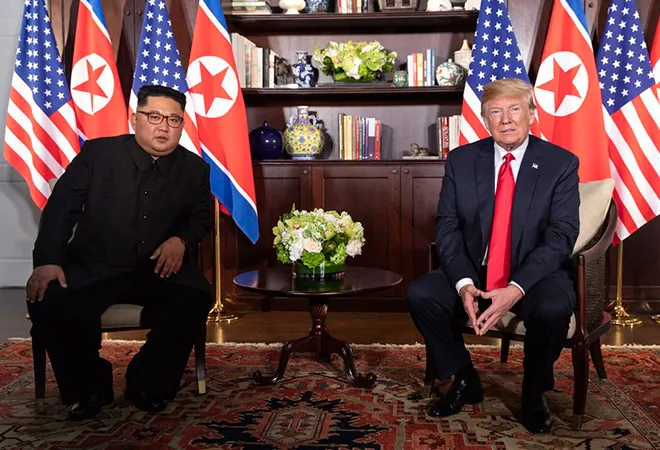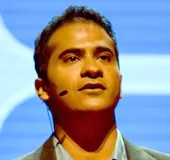-
CENTRES
Progammes & Centres
Location

Image Source: Director of Social Media, White House
President Trump & Chairman Kim during the Singapore summit
This week, at Washington DC, the political capital of America, all eyes were on the tiny city state of Singapore, as two of the most politically volatile individuals – US President Donald Trump and North Korean supreme leader Kim Jong-un -- descended on the island nation to have a rare but historic meeting. There is a lot of analysis coming out of the meeting between Trump and Kim.
A meeting that was surreal, historic, unprecedented and unlikely to begin with. It was an aberration from years of US foreign policy, where even lifelong Republican foreign policy wonks who had served in both Bush administrations were reviled ad nauseum that Trump was engaging with a dictator.
It seems rather bizarre that a pugnacious Donald Trump who derided Kim by calling him Rocket Man’ (Elton John wouldn’t be impressed) has now flip flopped to calling Kim ‘very honourable’. The praises didn’t end there, Trump was effusive and went on to say that Kim was a very talented man who loves his country very much.
"Trump is parsimonious when it comes to doling out praises; his twitter account attests to that. Even more ironic, that Trump had praises for Kim but condescension for Canadian Prime Minister Justin Trudeau at the G7 summit."
How did Trump, who derided Obama from talking to the Iranians, suddenly believe that he could successfully engage with Kim?
More importantly how did Kim Jong-Un go from despot to diplomat? How is a nonchalant dictator accused of gross human rights violations against his own people suddenly beamingly taking selfies at Singapore’s iconic Marina Bay Sands and across the Jubilee bridge.
There are many reasons why North Korea is often referred to as the ‘Hermit Kingdom’. The reclusiveness is just one aspect. Very few really understand what North Korea wants.
As hard as it maybe to believe, the Kim Il-Sung’s Democratic People’s Republic of Korea (DPRK) is a lot different from the one Kim Jong-Un is running. Priorities have changed and their engagement in world affairs has changed with it as well.
"Kim used diplomatic leverage to great use. The one thing the global community cherishes about dictators with nuclear weapons is to welcome the dictators who want to talk about getting rid of their weapons."
It began earlier this year when Kim turned on the charm offensive using the Winter Olympics in South Korea to send his sister and a North Korean special delegation. Kim even invited members of the International Olympic Committee to Pyongyang to show his sincerity in being more integrated into the global sphere.
Kim hosted a delegation from South Korea who conveyed to Washington that Kim wanted to meet Trump. Surprisingly, Trump agreed and sent Pompeo to meet with Kim. This laid the groundwork to the Singapore Summit. He further strengthened his allies, by making a quiet getaway to Beijing where he met with Xi Jinping (his first meeting with another head of state).
The youngest Kim made history as the first DPRK leader to cross into South Korea with his visit to the demilitarized zone (DMZ). His meeting with his South Korean counterpart, Moon Jae-in, at Panmunjom was a watershed moment in the history of the Korean peninsula; where two sides are still technically in a state of war. High profile public meetings between the two Koreas are rare and that too a public meeting at Panmunjom (a place that epitomizes the current state of hostility) was incredulous for several Korean watchers.
"Just like his native state, Kim Jong-Un remains an enigma. DPRK hasn’t shied away from its display of military bellicosity and slandering American forces for being hostile. Yet at the same time, his visit and meeting with South Korean President Moon and now with President Trump has caught many geopolitical analysts by surprise."
Kim seems to be taking a leaf out of the Otto Van Bismarck playbook, the late German chancellor and conservative Prussian statesman. Bismarck, deft at statecraft and a master of diplomatic chess, successfully maneuvered diplomacy to maintain Germany's position in a Europe where the power brokers were fast changing.
Suffice to say DPRK epitomizes secrecy and it’s still unclear as to what Kim really wants from President Trump and his South Korean allies.
Rest assured Kim and his DPRK establishment had fully prioritised their national interests in dealing with the Korean summit. His visit to Singapore, however, was marked with positive gesture as he has promised a commitment to work towards ‘denuclearisation’ of the Korean peninsula. However, as the New York Times reports that it was Kim who came out looking like the victor, even though it was Trump who was more loquacious about the success of the meeting.
For North Korea, Trump’s agreement to suspend US military exercises with South Korea is a big win. The North Koreans have long perceived this as a sign of militaristic aggression and simultaneously as an existential threat. Furthermore, the biggest win for Kim would have been receiving the legitimacy as a world leader by the world’s most powerful leader. The North Korean flag side by side next to the Star-Spangled Banner was a juxtaposition between the world’s oldest democracy and a reclusive state that is the paragon of totalitarianism.
Earlier this year, the Americans had urged their South Korean allies to be circumspect while meeting Kim. This week, it was Trump who was breaking bread (perhaps literally over lunch) with Kim.
After the Korean summit, ROK President Moon seemed convinced of Kim’s peaceful intention when he boldly proclaimed that “denuclearisation does not have different meanings in both North and South Korea”. For Kim, this is a classic Bismarck play, to be closer to your rivals than they are with each other.
North Korea in the past has reneged on its plans to denuclearise or allow a weapons inspection. The message from the Singapore summit seems to be anodyne homilies based on peace and prosperity in the region with no real concrete steps to govern or hold North Korea accountable for their actions.
"It seems rather unlikely that Kim has grown an overnight halo and is concerned with western democratic values for his people, who have been living in a state that has long eschewed from such principles. Just as Bismarck did, Kim too possesses this disdain for ideology or morals."
But Kim’s grand strategy and statecraft is ‘Bismarckesque’ in the sense, just as Bismarck prioritised the preservation of the newly created German state and any attempts to undo it; Kim and North Korea have long sought out the dream of uniting the Korean peninsula. One that they see divided and kept apart by the ‘American imperialists’.
Bismarck firmly espoused foreign policy based on a pragmatic assessment of strength over sentiment. The German chancellor sought opportunities in the present but drew inspiration from the future. To many it seems that the diminutive North Korean leader may have rolled the dice by meeting Trump but in actuality, just as Bismarck did, Kim realizes he can’t afford a two-pronged war.
Kim feels encircled with South Korea, Japan and the American forces stationed in both countries. While China is an ally, DPRK cannot resort to lone Chinese assistance in the case of conflict. In order to avoid a two-pronged war under a bellicose Trump administration, Kim has realised the goal is to win over the South Koreans and the South Korean diaspora in to believing his overtures for peace.
At this point, Bismarck would be impressed. Assuming Kim is not sincere, and the plan is to get the American bases out of South Korea by hoodwinking Trump, then consider the summit a win for Kim. The 45th President has surprisingly agreed to suspend military ties with South Korea. Defense analysts are bewildered at this overture which is seen as the U.S jettisoning its key allies.
Other geopolitical cognoscenti said the agreement is loosely concocted with little to hold Kim and DPRK accountable. The perceived watershed summit for many served as a grandiose gesture of garrulous promises, faux alliances and goodwill with adversaries.
It’s Trump on the other hand, that has eschewed from the classic Bismarck principles. Trump’s incendiary tweets are far from secrecy, his bellicose America First national interest is widely publicized, and Trump does not care about rubbing his adversaries the wrong way. One could argue, the classic 1971 meeting between Henry Kissinger and Zhou Enlai paved the way for successful Sino-US diplomacy since it was held in secrecy. One could only fathom that had this meeting taking place in a more surreptitious setting, more could have come out of it. But being clandestine is the antithesis of Trump, who is used to pomp and elan.
It was Kim who effectively played to the galleries this year. His ‘soft power’ display of watching K-Pop shows, meeting with South Korean bands, getting a tourist walk around Gardens by the Bay in Singapore, have helped him reposition his hardliner totalitarian image to someone amenable to change.
"Trump and Kim may have joined hands (literally with that handshake) to work together to negotiate a viable peace process in the region. However, should this go awry, one could feel that this could be a political coup-de-grace for Trump’s re-election bid in 2020."
Democrat candidates in 2020 would lap up this video for their political attack ads. George H. W. Bush would attest to being careful about what you say; this aftercall could be Trump’s “Read My Lips” moment.
The views expressed above belong to the author(s). ORF research and analyses now available on Telegram! Click here to access our curated content — blogs, longforms and interviews.

Akshobh Giridharadas was a Visiting Fellow based out of Washington DC. A journalist by profession Akshobh Giridharadas was based out of Singapore as a reporter ...
Read More +